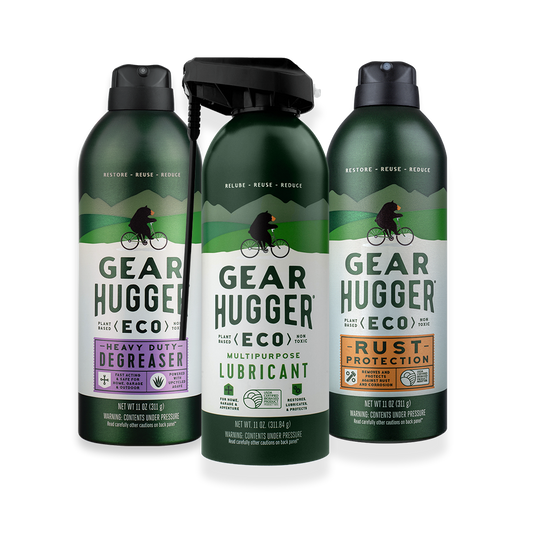Are My Outdoor Products Bad For The Environment?
Reducing the toxins you use outdoors—likely unknowingly—can make a huge difference in your family’s health, and also protect the planet we love so much. By keeping a close eye on the products you choose for yard maintenance and outdoor adventures, you can help keep the soil and water free of chemicals, protect your skin and lungs from contamination, and allow your kids and pets to play outside worry free.
In theory, we all WANT to make these changes, but sometimes it’s hard to know where to start. And even harder to decipher which products are okay to use and which come with some pretty hefty health and environmental risks. But not to worry, that’s where we come in. We’ve rounded up some of the top toxic outdoor products and their eco-friendly alternatives. Let’s get to it!
Tip #1: Ditch the Weed Killer
Products like Roundup used to kill weeds contain a chemical called glyphosate, a suspected carcinogen that was recently found in urine samples of 80% of tested kids and adults. These products also harm insect life like bees, which are essential for flowers and crop production. Herbicides may also kill the good plants that are near the sprayed weeds, so gardeners often waste money and time on rebuying plants.
Here are some simple alternatives to using herbicides like Roundup:
- Roll up those sleeves. Go for the old fashioned approach and pick weeds by hand. Pulling the weeds out by the roots takes time but you’ll get some exercise and it’s a zero-waste method.
- Boil weeds away. Boiling water is especially useful for plants creeping through driveway cracks as it destroys the root system.
- Let’s get acidic. Use vinegar to quickly kill weeds (and make delicious homemade pickles).
- Barrier to entry. Lay down weed barrier fabric with a layer of mulch to kill existing weeds and prevent new growth.
- Too hot to handle. Use reusable black plastic to heat weeds in a “solarization” process that’s low impact and effective.
Tip #2: Toss Your Petroleum-Based Lubricant
Most lubricants use petroleum as a core ingredient. These products contain PTFE, which is a resin that’s used in a variety of products like nonstick cookware. Unfortunately, PTFE is harmful to aquatic life, human skin and lungs, and other animals. An alternative to oil-based lubricants is Gear Hugger, a plant-based, non-toxic product that’s safe for kids and pets and features better performance under even the toughest conditions. It’s the perfect WD-40 alternative due to its anti-rust properties, degreasing capabilities, and ability to displace moisture.
Here are a few key reasons for ditching your PTFE-filled lubricant for Gear Hugger:
- PTFEs are “forever chemicals” that take a very long time to degrade, so they can negatively impact environments for hundreds of years.
- Bicyclists go through bottles of lubricants, as they need to maintain the chain, front and rear gears, the derailleurs and the brake levers. By swapping traditional bike lubricant for Gear Hugger, they can greatly reduce their environmental impacts.
- Use Gear Hugger for hundreds of outdoor uses, from cleaning patio door sliders to protecting lawn furniture to lubricating wheelbarrow wheels and protecting the bed from rust.
Tip #3: Manage Your Campsite’s Impact
While camping is a chance to enjoy and appreciate nature, it can actually lead to more ecological harm than good if you’re not super careful. Here are some of our tips for a no-impact campsite:
- When there are no bathrooms or vault toilets, burry #2 to keep things sanitary and prevent attracting animals. If it’s #1, dilute urine with water to lessen the amount of chemicals that might seep into groundwater or nearby lakes or streams.
- Wash dishes a few hundred feet from waterways to avoid contamination, and use natural-based soaps that don’t disrupt wildlife.
- Avoid using petroleum-based spray lubricants on your bikes, fishing rods and reels, rock climbing pulleys, and other gear. Grab a bottle of plant-based Gear Hugger instead to avoid harming the surrounding soil and water.
- Use washable cutlery, plates, and bowls to reduce disposable waste.
- Pack all of your garbage, including any cigarette butts that are toxic to animals, especially aquatic life.
Make Different Everyday Choices
Small, everyday choices CAN make significant impacts. There are many simple ways to reduce the toxins you unintentionally spread into the environment and into your own body. Here are a few eco-friendly, toxin-free life hacks:
- Metal > plastic. Use metal water bottles instead of plastic to reduce waste and prevent ingestion of chemicals that can leech through the plastic.
- Non-toxic repellent. Grab non-toxic insect repellent that uses natural ingredients that are safer on the skin and when inhaled.
- All-natural paints & stains. Stain your deck with a non-toxic product, especially one that does not emit volatile organic compounds (VOCs), which can cause health problems and contribute to air pollution.
- Ditch chemical fertilizers. Use grass clippings or compost instead of chemical fertilizers, which can flow into waterways through storm drains after it rains.
Reducing outdoor toxins doesn’t require an advanced degree in chemistry or thousands of dollars—just some informed decisions and a little extra effort here and there. So swap IN those non-toxic product alternatives and follow the tips above to keep you, your family, and the planet safer.





